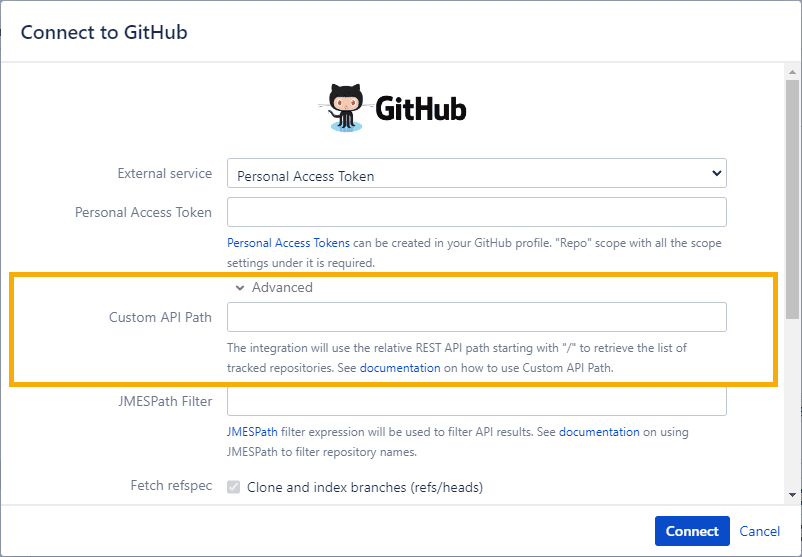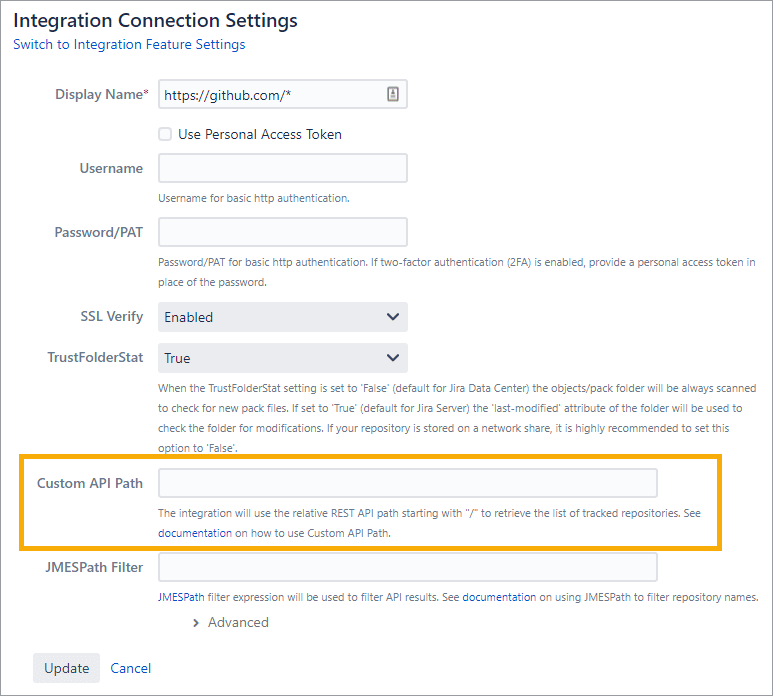The Custom API Path is a relative path that starts with “/”. The maximum allowed length is 2000 characters. The integration will use the relative REST API path to retrieve the list of tracked repositories.
The Custom API Path is called in the integration setup, settings changes, on a regular scheduled reindex and for a manual reindex.
What’s on this page:
- Accessible locations
- GitHub.com and GitHub Enterprise examples
- GitLab.com and GitLab CE|EE examples
- More how-to articles
Accessible locations
-
Add new integration Wizard ➜ Connection screen ➜ Advanced ➜ Custom API Path.
For example:

-
Manage repositories page ➜
 Actions ➜ Edit integration connection settings ➜ Custom API Path.
Actions ➜ Edit integration connection settings ➜ Custom API Path.
![]()
GitHub.com and GitHub Enterprise examples
1. Lists all repositories (default)
/user/repos
Gets a list of repositories by the authenticated user. This is the same as when no API path is specified.
2. Display all repositories from
/users/<username>/repos
Gets a list of public repositories for the specified user, <username>.
For example: /users/johnsmith/repos
3. Displays starred repositories
/user/starred
Gets a list of repositories by the authenticated user. This is the same as when no API path is specified.
/users/<username>/starred
Gets the list of starred public/private repositories for the specified user, <username>.
For example: /users/johnsmith/starred
4. List all repositories for the specified organization
/orgs/<org>/repos
Gets a list of repositories for the specified org, <org>. GitKraken
For instance:
/orgs/GitKraken/repos
This will filter for repositories only within the org: BigBrassBand. This works for GitHub integrations.
![]()
GitLab.com and GitLab CE|EE examples
1. Lists all projects (default)
/api/v4/projects?membership=true
Gets a list of projects. This is the same as when no API path is specified.
2. Display all projects from <user_id>
/api/v4/users/<user_id>/projects
Gets a list of projects for the specified user, <user_id>. johnsmith
3. Displays starred projects
/api/v4/projects?starred=true
Returns GitLab projects that have been starred by the connecting GitLab user.
4. Limit to owned projects
/api/v4/projects?owned=true
The current user will be limited to the projects it’s explicitly owned.
5. List projects from within a group
/api/v4/groups/5245789/projects<br>/api/v4/groups/BigBrassBand/projects
Returns the list of repositories within a GitLab group (or GitLab subgroup).
In the above examples, you can use the Group id or your Group name as query parameter.
6. List projects from the specified subgroup
/api/v4/groups/5245789/projects?include_subgroups=true
/api/v4/groups/GitKraken/projects?include_subgroups=true
In the above examples, the ?include_subgroups=true API extension will return a recursive list of repositories within a nested GitLab Group (or GitLab Subgroup) where the #, 5245789, is the Group id; and GitKraken is the Group name.
For more information on GitLab custom API paths, see GitLab API.
Gitlab v9.5 and above — only API v4
Gitlab v9.0 to v9.4.x — API v3 and API v4 (support for API v3 is deprecated)
The GitLab.com API can see all the public projects. For GitLab.com, we recommend using JMESPath over the Custom API path when possible. For more information, see Working with JMESPath filters.
While Custom API Path and JMESPath filter are mutually exclusive, you can use one, the other, both or neither.
More how-to articles
How to create a HAR file and send it to support for analysis
Working with Custom API Path (this page)
Configure Source Code Diff Viewing
Creating and configuring SSH keys (Windows/MacOS/Linux)
Require Personal Access Tokens for user actions (create branch/pull request)
Ways to Index Git Data to Jira Issues
Proxy settings on adding integrations (except AWS CodeCommit)
Creating Personal Access Tokens
All product names, logos, and brands are property of their respective owners.
